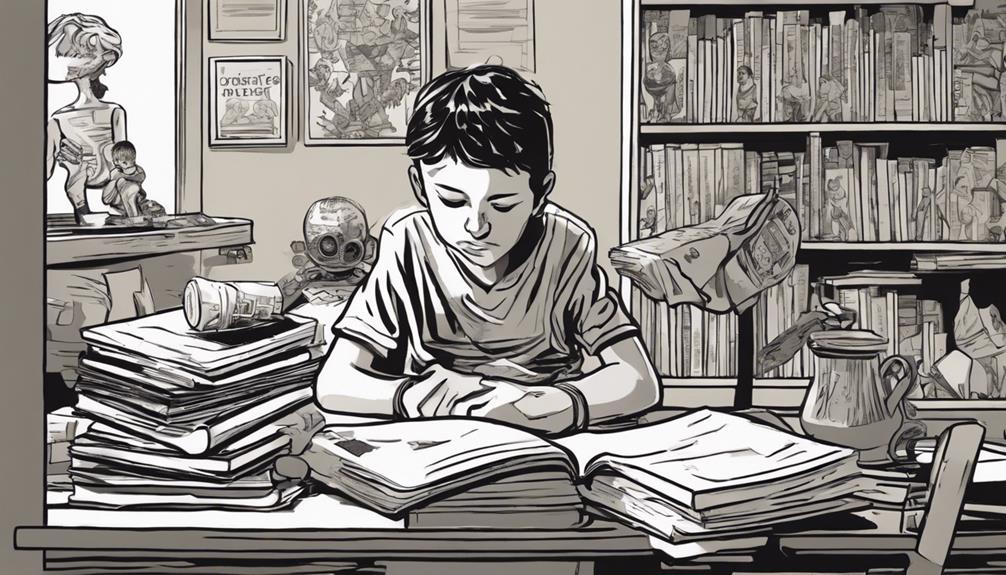When you're discussing the desire for another baby in a co-parenting situation, focus on open communication and empathy. Set aside dedicated times to talk, avoiding distractions. Use open-ended questions to explore each other's feelings and desires. It's essential to express gratitude and listen actively to validate each other's emotions. Reflect on your personal values and fears, and assess your emotional and financial readiness. If discussions become challenging, consider seeking professional guidance for support. By fostering honest conversations, you'll build a stronger co-parenting partnership. You'll find more insights on successfully maneuvering this sensitive topic ahead.
Key Takeaways
- Establish dedicated times for discussions to minimize distractions and promote open communication about having another child.
- Use open-ended questions to encourage deeper dialogue and understanding of each other's feelings and motivations regarding family expansion.
- Actively listen to each other's concerns and desires to validate feelings and enhance collaborative problem-solving.
- Reflect on personal values and past experiences to clarify motivations for wanting or not wanting another child.
- Consider seeking professional guidance to navigate emotional challenges and align family planning goals effectively.
Emotional Challenges in Family Expansion
When you're considering expanding your family, it's easy for emotions to bubble up, especially if you have children of the same sex. You might feel gender disappointment, which can lead to sadness and frustration when discussing the prospect of another child.
These emotional challenges often complicate conversations about family growth, particularly if infertility or medical issues are involved. The process of maneuvering such discussions can be similar to the complexities encountered during a divorce, where understanding emotional impact is essential.
It's important to recognize that your relationship can become strained when your family planning goals diverge. Acknowledging these feelings is the first step toward understanding each other's perspectives.
You may need help steering through these emotional waters, as fears and aspirations about having another child can surface and create tension.
Take time to explore your motivations for wanting or hesitating to add to your family. Open dialogue is key; if one partner changes their stance on having more children, feelings of betrayal may arise.
Reevaluating your family goals together can help you both align your values and desires, preventing misunderstandings. Remember, discussing these emotional challenges can strengthen your bond and lay the groundwork for a healthier conversation about expanding your family.
Effective Communication Strategies

To make co-parenting work, you need to establish open dialogue about your shared responsibilities.
Discussing your parenting roles helps clarify expectations and promotes teamwork. Engaging in activities that foster creativity can also enhance your communication skills and strengthen your relationship creative parenting workshops.
Establish Open Dialogue
Establishing open dialogue between co-parents is essential for traversing sensitive topics like family expansion.
Healthy communication creates an environment where both of you can express your needs and feelings without fear of judgment. To guarantee productive conversations about having another child, consider these strategies:
- Set Dedicated Time: Choose a specific time for discussions, free from distractions, so both can share thoughts openly.
- Ask Open-Ended Questions: Use questions like, "How do you feel about the idea of having another child?" to encourage deeper understanding.
- Express Gratitude: Acknowledge your co-parent's involvement in these discussions, which fosters a positive atmosphere and strengthens your co-parenting relationship.
- Stay Focused on Wants: Keep the conversation centered on specific desires rather than complaints, helping to clarify needs and minimize conflict.
Share Parenting Responsibilities
Effective communication plays an essential role in sharing parenting responsibilities, especially when discussing sensitive topics like family expansion. To guarantee both you and your co-parent remain actively involved, establish a structured communication plan that includes regular check-ins.
These discussions should focus on schedules, health updates, and parenting plans to prevent misunderstandings and foster a positive relationship with your child.
Utilize open-ended questions to promote deeper conversations about your feelings and aspirations regarding having another child. This approach encourages empathy and understanding, fundamental qualities for a good co-parent relationship.
As you navigate this sensitive topic, avoid negative language or blame; instead, express your needs and desires clearly. This creates a collaborative atmosphere that benefits everyone involved.
Document all conversations and agreements related to expanding your family. This record not only clarifies responsibilities but also reinforces commitments as they evolve.
Use Collaborative Problem-Solving
Using collaborative problem-solving creates a foundation for meaningful communication between co-parents when discussing family expansion.
By working together, you can foster an atmosphere of mutual respect and understanding. Here are some effective strategies to guide your discussions:
- Share Feelings: Encourage each other to express feelings and desires about having another child. This openness can clarify motivations.
- Use Open-Ended Questions: Ask questions that promote deeper insights into each other's perspectives, allowing for a more thorough dialogue.
- Schedule Discussions: Set aside dedicated time for these conversations to minimize distractions. This guarantees both parents are engaged and focused.
- Practice Active Listening: Summarize and reflect on what your co-parent shares. Validating their feelings can lead to a more constructive dialogue.
The Importance of Reflection

Reflection plays an essential role in co-parenting communication, especially when contemplating family expansion. Taking the time to think about your personal beliefs and motivations regarding having another child can lead to clearer communication and understanding. It's vital to evaluate how your past experiences shape your readiness for this decision.
Setting aside dedicated time for reflection allows you to explore your emotional responses and fears, helping you address any underlying concerns before discussing the right thing with your co-parent. Here's a quick table to reflect on while thinking:
| Reflection Focus | Questions to Ponder | Goals for Discussion |
|---|---|---|
| Personal Beliefs | What do you truly want? | Align on your desires |
| Past Experiences | How have previous experiences shaped you? | Understand each other's perspectives |
| Emotional Responses | What fears do you have about another child? | Address concerns openly |
| Family Goals | What values guide your family decisions? | Reassess shared goals |
| Readiness Assessment | Are you both ready for this expansion? | Confirm mutual readiness |
Seeking Professional Guidance

Many co-parents find that seeking professional guidance can greatly enhance their communication when considering family expansion. Engaging with a therapist or counselor can create a neutral space for you to discuss your desires and concerns about having another child.
This professional support is invaluable for managing emotional challenges and ensuring both partners feel heard. Additionally, incorporating strategies for stress management techniques can further improve the quality of your discussions, making it easier to address any underlying anxieties.
Here are four key benefits of seeking professional guidance:
- Facilitates Constructive Communication: A professional can help you articulate your thoughts and feelings, leading to more productive conversations.
- Addresses Emotional Challenges: Therapy provides tools to manage any anxiety or uncertainty related to expanding your family.
- Supports Family Planning Goals: Professionals can assist in aligning your visions for family growth, ensuring you both are on the same page.
- Offers Educational Resources: Workshops and articles can give you insights into the complexities of family planning, enhancing your decision-making process.
Understanding Personal Motivations

When considering the decision to have another child, it's essential to reflect on your personal values and emotional needs.
Exploring your motivations can lead to a clearer understanding of your desires, similar to how self-awareness enhances relationship choices.
Think about what nurturing means to you and how it aligns with your family goals.
Personal Values Exploration
Understanding your personal motivations for wanting or not wanting another child is essential for effective co-parenting. Engaging in self-reflection allows you to clarify your personal values, helping to align your goals with your co-parent.
Consider these four key areas when exploring your motivations:
- Nurturing Instincts: Reflect on whether you feel a strong desire to nurture and expand your family.
- Financial Stability: Assess your current financial situation and how it affects your readiness for another child.
- Emotional Readiness: Evaluate your emotional capacity to take on the challenges of raising another child.
- Alternative Options: Think about other ways to fulfill your nurturing desires, such as adopting or fostering.
Emotional Needs Assessment
Engaging in a thorough emotional needs evaluation is essential for managing the complexities of co-parenting decisions. Understanding your personal motivations for wanting another baby involves reflecting on your beliefs about family size and emotional fulfillment.
If you're living apart or maneuvering single parenthood, these discussions become even more critical. Honest conversations with your co-parent about your emotional needs can uncover underlying fears or desires that might shape your family planning.
For instance, if gender disappointment influences your feelings about having another child, recognizing this can help you both empathize and understand each other better. It's also important to acknowledge valid reasons for wanting or not wanting additional children.
This understanding can foster cooperation and minimize conflict. If you find that expanding your family isn't feasible, consider exploring alternatives like fostering community connections, which can provide emotional fulfillment and broaden your perception of family bonds.
Collaborative Decision-Making

Collaborative decision-making in co-parenting is vital, especially when considering adding another child to the family.
To navigate this significant choice, it's important to foster an environment of open communication and active listening. As you discuss your plans, you might also consider how your current family dynamics, including the needs of your pets, play a role in this decision.
For instance, understanding the importance of maintaining a healthy weight for your dogs can help you assess the overall environment for a new child.
Here are four key steps to guarantee a smooth decision-making process:
- Share Your Thoughts: Both parents should openly express their feelings and perspectives about expanding the family without fear of judgment.
- Practice Active Listening: Take the time to truly listen to each other's motivations and concerns. This helps build empathy and understanding, laying a solid foundation for collaboration.
- Establish a Framework: Create a mutually agreed-upon structure for discussions to keep conversations focused on both your child's best interests and your desires.
- Utilize Tools: Consider using parenting plans or co-parenting apps to stay organized. These tools can help ensure both parents are informed and engaged in the decision-making process.
Frequently Asked Questions
What Is Inappropriate Co-Parenting While in a Relationship?
Inappropriate co-parenting while in a relationship includes actions like withholding important information about your child's schooling or activities.
Scheduling events during the other parent's time without discussing it first shows disrespect and can create conflict.
Denying access to crucial records or failing to communicate on significant decisions, such as medical care, can lead to misunderstandings.
It's important to keep both parents involved in the child's life to guarantee a healthy co-parenting dynamic.
How to Talk About Having Another Baby?
When it comes to discussing having another baby, you'll want to strike while the iron's hot.
Find a calm, private space where you both can share your feelings openly. Ask each other about the current family dynamic and what a new child might bring.
Acknowledge any fears or concerns, and talk about practicalities like finances and support.
Regular check-ins can help you both reassess your thoughts as time goes on.
What Is an Example of Failure to Co-Parent?
A clear example of failure to co-parent is when one parent schedules a child's activities during the other parent's designated time without consulting them first. This not only creates conflict but also undermines your efforts to work together.
Additionally, withholding important information about schooling or medical decisions can lead to feelings of exclusion and resentment.
Effective co-parenting requires open communication and mutual respect to guarantee both parents are involved in their child's life.
What Is Unhealthy Co-Parenting?
Unhealthy co-parenting occurs when you and your co-parent fail to communicate effectively and prioritize your child's needs.
This might include withholding important information, scheduling activities without consent, or excluding the other parent from significant decisions.
These behaviors can create resentment and feelings of isolation, leading to a strained relationship between you, your co-parent, and your child.
Ultimately, it undermines the emotional stability and well-being of your child, making collaboration essential.
Conclusion
In steering the desire for another baby, it's essential to prioritize open communication and mutual understanding. Reflect on your motivations and the emotional challenges that come with family expansion. By engaging in collaborative decision-making, you can foster a supportive environment. So, as you discuss this significant step, ask yourself: What kind of family do you truly want to create together? Embracing this journey with honesty and compassion will guide you toward a fulfilling path.










